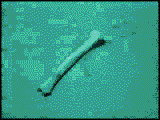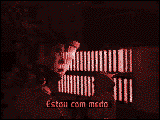
The human being has always wished to share tasks among many to increase its work power without increasing the individual effort implied in the solving of each task. If this increase in power could be done by tools without consciousness, who just solved the task and then handed to its owner the merits for its work, even better! The vanity of the author was protected.
Simple machines, as those who terrorize high school physics students, are good examples of helpers dedicated to one specific task. More than just amplify power, they also enable results before impossible to achieve.

Stanley Kubrick and Arthur Clarke were extremely sucessful in 2001 when they depicted the birth of the first tool: a bone. It might sound simple, even silly, but it allowed a primate group to hunt better and triumph over another group.
But the dream of powerful helpers free from human weaknesses has always been around. Like in Alladin's lamp, with a built-in genius who could turn almost every dream reality (altough I think it was a shareware genius, because it allowed ONLY THREE WISHES!! ;-). Pay attention to this: "almost every (human) wish can come true". Only something -or someone- not limitted by standard human rules -yet mantaining some relation to them- could do such thing.
The "lamp genie" changed its appearance very much through the time, or even better, its origin shifted from absolutely magical, like Alladin's partner, to the cabalistic Golem (whose hardware is clay and software are magic words) described by Isaac Singer up to the twentieth century, where the role of "magic helper" was passed to the computers and on them were projected all the fantasies of panacea and hegemony. As an example, in Demon Seed, 1977, the computer Proteus is created with the explicit intention of making human thought obsolete.
If were the helpers wished in a series of stories, other ones, not less numberous, spoke about the conflict between power and maturity. Singer's Golem plays tricks normal to an immature child, but certainly not suitable for a super-powerful clay Frankensetin, making its creator regret having invoked the forces who made the creature. A lot of time before that, Icarus falls in the sea because he had not read the troubleshooting guide of its wings and, many years after, the creatures rebels aganist Victor Frankenstein. The only way out is the destruction of the creature.

HAL 9000, the "sixth member of the crew" of 2001 is turned off after killing almost every crewman in the Discovery spaceship.
Computers fit perfectly to the role of fear-deserving monsters, once the general public still thinks the machine can "think" as well as anyone - just faster and without flaws.

In this interview with the BBC, HAL 9000 leaves absolutely no doubt it is perfect, what will be later questioned in the film.


 Roberto Tietzmann - RTIETZ@CESUP.UFRGS.BR
Roberto Tietzmann - RTIETZ@CESUP.UFRGS.BR
 Welcome page |
LEAD Home
Welcome page |
LEAD Home